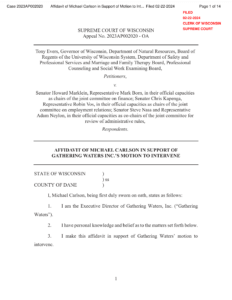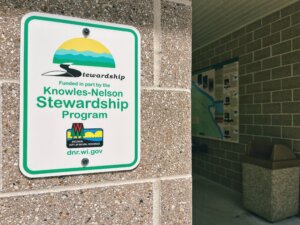The Wisconsin Supreme Court heard oral arguments in the Knowles-Nelson Stewardship Program case at on April 17th. Legal documents related to the case can be found on the WI Supreme Court’s website, though the site can be tricky to navigate. To give readers a clearer picture of what’s at stake, we’ve summarized the key points from briefs submitted to court. Our summaries are written to make the arguments in the case more accessible to all of us who aren’t lawyers. The documents themselves are linked below and are all published on the Supreme Court’s website. If you’re up for it, dig into the documents themselves!
petition & Opening Briefs
In October 2023, Governor Evers and the Department of Justice (DOJ) sued the WI legislature, arguing that the Joint Finance Committee’s (JFC) practice of arbitrarily vetoing Knowles-Nelson Stewardship Program grant approvals through anonymous objections violates the separation of powers outlined in the WI constitution. Gathering Waters intervened in the case as a co-plaintiff in order to tell the Knowles-Nelson story and to add our own legal arguments to those being presented by the DOJ.
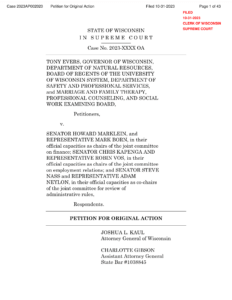 What is it?
What is it?
This is the legal argument that the DOJ submitted when it asked the court to take the case.
What does it mean?
The DOJ argues that several legislative veto statutes violate the Wisconsin Constitution’s separation of powers doctrine by improperly allowing legislative committees to block actions by executive branch agencies. The DOJ initially asked the court to consider three different cases in which a legislative committee maintains an effective veto authority:
-
- The Joint Committee on Finance (JCF) over Department of Natural Resources (DNR) decisions on Knowles-Nelson Stewardship Program conservation projects.
-
- The Joint Committee on Employment Relations (JCOER) over pay raises for University of Wisconsin (UW) employees that were included in the state budget passed by the full legislature.
- The Joint Committee for Review of Administrative Rules (JCRAR) over rules promulgated by the Department of Safety and Professional Services (DSPS) on commercial building codes and an examining board’s ethics rules for social workers, marriage/family therapists, and counselors.
The DOJ contends these vetoes violate separation of powers in two key ways:
- They intrude on the executive branch’s authority to administer programs and spend appropriated funds as directed in laws passed by the full legislature. The constitution does not allow legislative committees to then micromanage or block the executive’s implementation.
- They allow legislative committees to essentially make new laws and amend agency authority without following the constitutional requirements of bicameralism and presentment to the governor.
The petition provides details on how the challenged veto processes work and how the committees have recently used them to block executive actions, in some cases indefinitely. It argues these are unlawful legislative attempts to control the execution of law.
Ultimately, the court agreed to hear the Knowles-Nelson portion of the case while holding the other two issues in abeyance, meaning they reserve the right to hear them at a later time.
What is it?
This is a sworn statement filed in support of our motion to intervene on behalf of the Knowles-Nelson Stewardship Program. The affidavit, submitted by our Executive Director, Mike Carlson, describes in detail how legislative obstruction has impacted land trusts’ ability to utilize the Knowles-Nelson Stewardship Program.
What does it mean?
The Knowles-Nelson Stewardship Program, created in 1989, has been central to Gathering Waters’ mission as it provides significant funding for land trusts to acquire land for conservation, recreation, and public enjoyment across Wisconsin. Over the years, Gathering Waters has played an active role in advising the Department of Natural Resources (DNR) on the Program’s implementation.
Gathering Waters has grown increasingly concerned with obstruction of the program in recent years by a handful of members of the legislature’s Joint Committee on Finance. Since 2019, the Joint Committee on Finance (JCF) has blocked more than two dozen projects with arbitrary, anonymous vetoes.
According to Gathering Waters’ Executive Director, Mike Carlson, there have been 28 anonymous objections lodged by JCF against Knowles-Nelson projects during the Evers administration. Many objected projects languish indefinitely without a hearing or vote, forcing some applicants to withdraw and deterring others from applying in the first place.
Carlson cites specific examples where JCF objections caused projects to be downsized, delayed for years, or rejected outright after DNR approval. In response, Gathering Waters has had to divert substantial staff time and resources to advocacy, communicating with JCF members, organizing public awareness campaigns, and helping land trusts secure alternative funding. Three notable examples are shared in the affidavit:
- Landmark Conservancy’s “Meridean Barrens” project to acquire over 1,000 acres in Dunn County was approved by DNR in 2018 for over $1.1 million. After an anonymous JCF objection, it languished for three years before being downsized to just 365 acres with a $244,795 grant request to avoid JCF review.
- The Ozaukee Washington Land Trust was awarded $2.3 million to acquire the “Cedar Gorge-Clay Bluffs” property along Lake Michigan. Despite efforts like hosting a site tour for a JCF member, an anonymous objection in 2021 stalled the project until alternative funds were secured.
- The DNR-approved “Pelican River Forest” project by The Conservation Fund faced an anonymous JCF objection after submitting in 2022. JCF ultimately rejected it in 2023, requiring a scramble for different funding sources.
This JCF interference has had a significant chilling effect on the program. Knowles-Nelson expenditures have declined more than 80% from their 2007 peak. Land trusts increasingly rely on private philanthropy rather than applying for Knowles-Nelson grants because the process has become so unpredictable. Some land trusts limit their requests to less than $250,000 in order to avoid JCF review altogether.
The affidavit argues that JCF’s anonymous objections and lack of transparency are troubling, effectively blocking worthy conservation projects that benefit Wisconsin through an unaccountable process. Gathering Waters believes the Court’s intervention is urgently needed to restore the Knowles-Nelson Program and to get conservation efforts back on track.
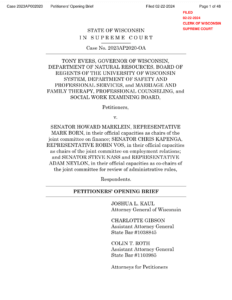 What is it?
What is it?
This is where the DOJ lays out their arguments for why the court should rule in their favor.
What does it mean?
The DOJ argues that the statutes allowing the Joint Finance Committee (JFC) to block DNR’s decisions on Knowles-Nelson Stewardship projects violate the separation of powers in two independent ways:
- The statutes unconstitutionally transfer the executive branch’s core power to execute the law to the legislative branch. Once the legislature passes laws creating and funding the Stewardship program, it becomes the executive branch’s job to administer the program and decide how to spend the appropriated funds on specific projects. Allowing JFC to veto those executive spending decisions improperly gives the legislature control over executing the law.
- The statutes allow JFC to essentially modify the Stewardship program’s appropriations without following the constitutional requirements of passing a bill through both houses of the legislature and presenting it to the governor (bicameralism and presentment). If the legislature wants to change an existing appropriation, it must pass a new law, not simply have a committee vote to block certain projects.
The DOJ contends that the “core and shared powers” framework some Wisconsin cases use does not alter these basic separation of powers principles. Core powers like executing the laws cannot be shared between branches. And even for shared powers, each branch must still only exercise its own constitutional powers.
The main case the legislature relies on in defending its actions, the 1983 Court of Appeals decision in J.F. Ahern Co. v. Wisconsin State Building Commission, is inapplicable, the DOJ argues, because it involved the unique context of state building projects, not a standard grant program like Knowles-Nelson. The DOJ argues that Ahern was wrongly decided anyway because it ignored bicameralism and presentment requirements and misapplied the shared powers doctrine. The Supreme Court should overrule Ahern, the DOJ asserts.
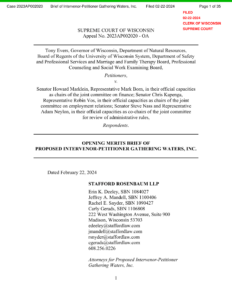 What is it?
What is it?
This is where Gathering Waters lays out our main arguments for why the court should rule in our favor.
What does it mean?
Gathering Waters argues that the statutes allowing the Joint Finance Committee (JFC) to block the Department of Natural Resources’ (DNR) Knowles-Nelson Stewardship grant decisions violate two key principles in the Wisconsin Constitution: the separation of powers between branches of government, and the requirements that legislation be passed by both houses of the legislature and presented to the governor for signature or veto (known as bicameralism and presentment).
On separation of powers, Gathering Waters contends it is well-established that once a law is enacted and funds are appropriated, it is the executive branch’s job to carry out that law. The legislature’s role ends with passing laws; it cannot control how those laws are executed. Yet that is exactly what the JFC veto provisions do – they allow a legislative committee to control DNR’s administration of the Stewardship program after it has already been enacted and funded by the full legislature.
Gathering Waters emphasizes that administrative agencies like DNR are part of the executive branch, so when they act, they are exercising executive power. Letting JFC override DNR’s grant decisions unconstitutionally transfers executive power to the legislature. It improperly combines the separate executive and legislative functions into one branch.
Gathering Waters further argues that the legislature cannot constitutionally give itself or a small group of its members the power to execute the laws it enacts. The JFC veto is unlawful regardless of how it is exercised in any particular case, because it fundamentally usurps the authority of the executive branch.
On bicameralism and presentment, Gathering Waters argues the Wisconsin Constitution requires the legislature to act through passing bills that are approved by both the Assembly and Senate and then presented to the governor. The JFC veto provisions violate this by allowing a committee to essentially amend the Stewardship program’s budget without going through the full lawmaking process.
Gathering Waters contends committee actions cannot constitutionally replace the lawmaking process. The requirements that bills pass both houses and be presented to the governor serve important functions like preventing any one faction from dominating and requiring deliberation. While a legislative committee might make the process more efficient, that is not a valid reason to bypass constitutional requirements. Only a few courts have allowed any deviation, and only in emergency situations with strict safeguards that are not present here.
Under the JFC veto provisions, Gathering Waters points out, a tiny subset of legislators can anonymously object to a Stewardship grant, put it on indefinite hold without even having a hearing, and effectively override DNR’s decision under the enacted statute, all without any involvement of the full legislature or governor. This is exactly the type of unilateral policymaking the bicameralism and presentment requirements prohibit.
Finally, Gathering Waters argues that regardless of JFC’s specific decisions in any given case, the mere delegation of this veto power to the committee is unconstitutional under all circumstances. The failure to comply with bicameralism and presentment taints the entire JFC process and cannot be fixed. Therefore, the challenged provisions should be declared entirely unenforceable.
reply Briefs
A reply brief is a written document that addresses the arguments made by the other party. It’s essentially a chance to counter arguments and defend one’s position.
What is it?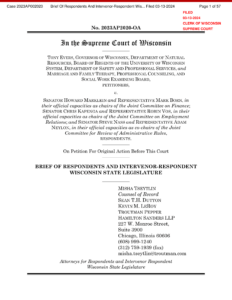
The legislature responds to the arguments laid out in the DOJ and Gathering Waters’ opening briefs
What does it mean?
The Legislature argues that the statutes allowing the Joint Finance Committee to block the DNR’s Stewardship grant decisions are constitutional under the Wisconsin Supreme Court’s decisions in Martinez (1992) and J.F. Ahern Co. (1983). Those cases, they argue, upheld the legislature’s ability to delegate authority to agencies while retaining the right to review their actions through legislative committees. The legislature contends this is a permissible “cooperative venture” between branches, not a violation of the separation of powers principle that each branch has distinct roles.
Essentially, the legislature claims agencies have no core executive powers that a legislative committee can’t touch. Because agencies are created by the legislature, any limits on them are fine as long as there are some general “standards or safeguards.” The legislature says the constitutional steps of passing a bill through both houses and presenting it to the governor (known as bicameralism and presentment) aren’t required either, because reviewing agency decisions isn’t really “legislation.”
They warn that siding with the governor risks upsetting numerous legislative oversight provisions that the political branches have relied on for decades.
The legislature dismisses contrary rulings from the U.S. Supreme Court and other states, claiming Wisconsin has a unique separation of powers doctrine. It insists Martinez and Ahern were well-reasoned and the principle of adhering to precedent requires following them absent a special justification to overturn established law.
What is it?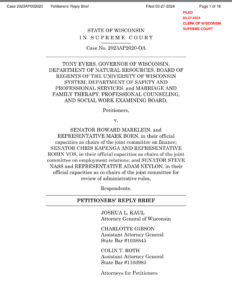
The DOJ responds to the arguments presented in the legislature’s opening brief.
What does it mean?
The DOJ argues that once the legislature passes a law creating and funding a program like Knowles-Nelson, the legislature’s role is complete. Allowing legislative committees to thereafter approve or reject projects under the program violates the separation of powers doctrine by enabling the legislative branch to participate in executing the law.
The Department contends that the legislature relies on two flawed arguments:
- The legislature claims that all actions by executive branch agencies involve power shared with the legislature. However, the Wisconsin Supreme Court previously rejected this “dangerous” idea in the 2020 SEIU v. Vos decision.
- The legislature argues the legislature’s “power of the purse” allows legislative committees to oversee executive spending. But the constitution’s text does not support this – once funds are appropriated by law, the executive can spend the money to implement that law without further legislative involvement.
The Department also argues that two prior cases the legislature relies on heavily, J.F. Ahern Co. v. Wisconsin State Building Commission and Martinez v. DILHR, should not determine the outcome of the case and should be overruled. Martinez only addressed rulemaking and Ahern dealt with the distinct context of the state building program. More importantly, the legislature argues, Martinez was wrongly decided because it allowed temporary legislative vetoes that violate constitutional lawmaking procedures, while Ahern misapplied the court’s current “core” vs “shared” powers framework for its separation of powers analysis.
Finally, the DOJ rejects the legislature’s policy arguments, noting that while the legislative vetoes may be convenient for the legislature, convenience cannot override the requirements of the state constitution. Many other states function well without such vetoes.
What is it?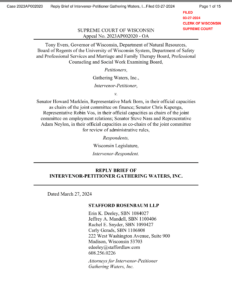
Gathering Waters responds to the arguments presented in the legislature’s opening brief.
What does it mean?
In its reply brief, Gathering Waters argues that the Legislature’s attempts to justify the Joint Finance Committee’s (JFC) veto authority over the Knowles-Nelson Stewardship Program are constitutionally unsupportable.
First, Gathering Waters contends that JFC’s oversight of the program’s administration by the Department of Natural Resources (DNR) is an impermissible exercise of executive power by a legislative committee. The mere fact that the program involves spending state funds does not transform it into a shared legislative-executive power, as the Legislature suggests. Accepting that argument would effectively eliminate any independent executive authority, since virtually all executive actions involve spending money the Legislature has appropriated.
Second, Gathering Waters asserts that JFC’s ability to block the DNR’s implementation of Knowles-Nelson without having to pass a new law violates the constitutional requirements of bicameralism and presentment. The Legislature’s efforts to distinguish U.S. Supreme Court precedent on this issue are unpersuasive. And while the Legislature relies heavily on two older Wisconsin cases, neither actually supports its position or remains good law in light of more recent separation of powers decisions.
Third, Gathering Waters argues there is no merit to the Legislature’s claim that JFC oversight is needed to prevent mismanagement of the program by the DNR. The alleged overspending the Legislature points to either did not occur or resulted from policy choices the Legislature itself made. More fundamentally, even if the Legislature disagrees with how the DNR is executing the law, the proper recourse is to amend the statute, not to let a legislative committee unilaterally override the DNR’s executive authority.
In sum, Gathering Waters urges the Wisconsin Supreme Court to put a stop to the unconstitutional legislative vetoes at issue and prevent the Legislature from continuing to aggrandize its power at the expense of the executive branch. Gathering Waters asks the Court to declare the challenged provisions of the Knowles-Nelson statute unenforceable.
Amicus Briefs
Amicus briefs, or “friend of the court” briefs, allow groups who have an interest in the issues being debated, but are not themselves parties to the case, to weigh in with their own perspectives.
Amicus briefs supporting DOJ and Gathering Waters have been submitted by:
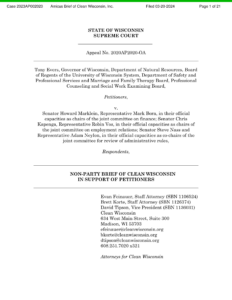 Clean Wisconsin, an environmental advocacy group, argues that the Joint Finance Committee’s (JFC) ability to block DNR’s Stewardship grant decisions violates the separation of powers. It contends that when JFC vetoes DNR’s decisions, it is improperly controlling how the law is implemented, an executive function. It also argues JFC’s vetoes effectively amend the Stewardship statute without going through the constitutionally required lawmaking process of passing a bill through both houses and presenting it to the governor.
Clean Wisconsin, an environmental advocacy group, argues that the Joint Finance Committee’s (JFC) ability to block DNR’s Stewardship grant decisions violates the separation of powers. It contends that when JFC vetoes DNR’s decisions, it is improperly controlling how the law is implemented, an executive function. It also argues JFC’s vetoes effectively amend the Stewardship statute without going through the constitutionally required lawmaking process of passing a bill through both houses and presenting it to the governor.
Beyond the constitutional problems, Clean Wisconsin asserts that legislative committee vetoes undermine functional government decision-making. It points to evidence that such vetoes amplify special interest influence, enable partisan gridlock, and lead to arbitrary outcomes by allowing committees to block executive actions without hearings, recorded votes, or explanations.
As an example, Clean Wisconsin describes its experience with a recent update to the state energy conservation code. It argues that special interest groups largely ignored the multi-year public rulemaking process, instead swooping in at the last minute to lobby a handful of legislators to indefinitely block the update without any public meeting or rationale. Clean Wisconsin contends this illustrates how legislative vetoes incentivize an opaque, anti-democratic process.
Clean Wisconsin urges the Supreme Court to address all constitutionally suspect legislative vetoes, not just JFC’s actions in this case, to end government dysfunction. While legislative vetoes may seem expedient, the brief suggests they ultimately serve special interests rather than the public good.
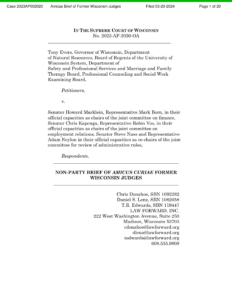 The former judges argue that the Wisconsin Constitution was established in part to guard against abuses by the Legislature, as there were concerns at the time about the Legislature being too vulnerable to special interests. The Constitution aimed to limit legislative power through various means to increase transparency and ensure a more open, orderly process.
The former judges argue that the Wisconsin Constitution was established in part to guard against abuses by the Legislature, as there were concerns at the time about the Legislature being too vulnerable to special interests. The Constitution aimed to limit legislative power through various means to increase transparency and ensure a more open, orderly process.
A key constitutional check on legislative overreach is the judiciary’s core power to interpret and apply the law. The judges contend that the Joint Finance Committee’s (JFC) ability to block Department of Natural Resources’ grant decisions under the Stewardship program unconstitutionally intrudes on this judicial authority.
When JFC objects to a grant as violating the law, it is improperly acting as a court by interpreting legal requirements. But unlike a court, JFC has no standards of review, no obligation to provide reasoning, and no due process protections. Its decisions have the effect of a permanent injunction but without the normal appeals process. This allows a legislative committee to circumvent the judiciary’s role.
The judges note that the Legislature can properly regulate agency actions by passing laws that set limits and guidelines. It can also challenge agency actions in court if it believes they are unlawful. But the JFC vetoes permit an end-run around these procedures.
The brief also argues that similar legislative vetoes over administrative rules, while not directly at issue here, further illustrate how the Legislature has unconstitutionally assumed judicial powers to determine statutory compliance and whether policies have the force of law.
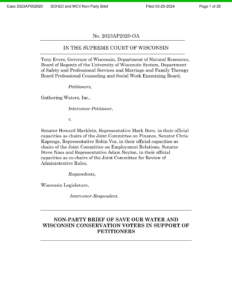 Wisconsin Conservation Voters and Save Our Waters‘ shared brief argues that the Wisconsin Supreme Court’s 1992 decision in Martinez v. DILHR, which upheld the constitutionality of legislative committee vetoes of administrative rules, rests on two flawed assumptions: (1) that committee vetoes enhance democratic accountability, and (2) that their effects are only short-term.
Wisconsin Conservation Voters and Save Our Waters‘ shared brief argues that the Wisconsin Supreme Court’s 1992 decision in Martinez v. DILHR, which upheld the constitutionality of legislative committee vetoes of administrative rules, rests on two flawed assumptions: (1) that committee vetoes enhance democratic accountability, and (2) that their effects are only short-term.
The brief contends the reality is quite different, based on the organizations’ experience with the implementation of 2019 Wisconsin Act 101. That law prohibited the discharge of PFAS-containing firefighting foam, but the Joint Committee for Review of Administrative Rules (JCRAR) used its veto power to suspend key provisions of the Department of Natural Resources’ emergency rule implementing the law. As a result, PFAS foam can still be discharged to wastewater treatment plants not designed to remove PFAS, contrary to the intent of Act 101. Due to how the committee veto process works, this veto is effectively permanent even though it was supposed to be temporary.
The brief argues that the PFAS example shows how committee vetoes can permanently alter the law without going through the normal legislative process, undermining the constitution’s system of checks and balances. It also contends the vetoes frustrate democratic accountability, as they empower a small group of legislators who are not elected by most Wisconsinites to override the decisions of the full legislature and governor.
The organizations urge the Supreme Court not to extend the flawed reasoning of Martinez to the current case involving Joint Finance Committee vetoes. Instead, they argue the Court should apply separation of powers principles that provide clearer lines of accountability. They also encourage the Court to take up the claims regarding JCRAR vetoes that were held in abeyance.
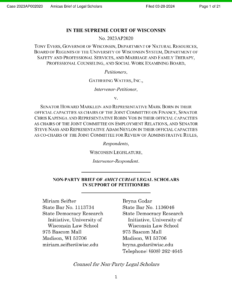 The legal scholars argue that the Joint Finance Committee’s power to block Department of Natural Resources’ decisions under the Knowles-Nelson Stewardship Program violates the Wisconsin Constitution in two clear ways.
The legal scholars argue that the Joint Finance Committee’s power to block Department of Natural Resources’ decisions under the Knowles-Nelson Stewardship Program violates the Wisconsin Constitution in two clear ways.
First, the powers impermissibly allow JFC to seize the executive’s authority to manage already-appropriated funds, flouting the separation of powers principle that the legislature makes laws but does not enforce them.
Second, by allowing JFC to conclusively overturn executive decisions, the committee effectively alters appropriations statutes without going through the constitutionally mandated lawmaking process of passing a bill through both houses of the legislature and presenting it to the governor for approval or veto. The scholars contend this amounts to an unconstitutional amendment of of an existing statute by a legislative committee.
The scholars emphasize that the Wisconsin Constitution’s strong commitment to government by the people and accountability to the public reinforces the unconstitutionality of JFC’s veto powers. Separating powers among three elected branches is meant to ensure the people remain sovereign and can hold their government accountable. But the challenged JFC powers concentrate authority in the hands of a small, unrepresentative committee unaccountable to most voters – the very opposite of what the constitution intends.
Looking to other states, the scholars note that courts across the country have almost unanimously rejected legislative vetoes, viewing them as anti-democratic. Whether applying a strict textualist or a more flexible real-world analysis, state courts consistently hold that legislative committees cannot make statewide law.
The scholars urge the Wisconsin Supreme Court to similarly hold that JFC’s veto powers violate the state constitution’s system of separated powers and its underlying principles of democratic government.
Amicus briefs opposing DOJ and Gathering Waters have been submitted by:
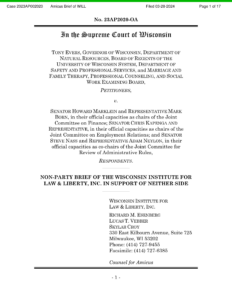 The Wisconsin Institute for Law and Liberty (WILL) filed an amicus brief supporting the Legislature’s position in this case concerning the constitutionality of legislative committee vetoes over executive agency decisions. WILL urges the Wisconsin Supreme Court to be cautious about reviving the non-delegation doctrine, which holds that the legislature cannot delegate its lawmaking powers to the executive branch or administrative agencies.
The Wisconsin Institute for Law and Liberty (WILL) filed an amicus brief supporting the Legislature’s position in this case concerning the constitutionality of legislative committee vetoes over executive agency decisions. WILL urges the Wisconsin Supreme Court to be cautious about reviving the non-delegation doctrine, which holds that the legislature cannot delegate its lawmaking powers to the executive branch or administrative agencies.
WILL argues that while it would welcome a return to the non-delegation doctrine’s original principles, the Court should not do so selectively in a way that only shifts power to the executive branch, as WILL claims Governor Evers and Gathering Waters advocate. However, it’s important to note that the Governor and Gathering Waters are not actually asserting an improper delegation of legislative power. Rather, they argue that the Joint Finance Committee’s veto power unconstitutionally usurps the executive branch’s authority to administer programs and spend appropriated funds.
WILL contends that accepting the Governor and Gathering Waters’ position would require dramatically reworking existing law and overturning precedent like the Martinez decision allowing legislative oversight of agency rulemaking. They point out that the Governor and Gathering Waters rely on dissenting opinions criticizing the erosion of the non-delegation doctrine, suggesting they want the Court to change the law rather than apply it.
However, WILL’s argument appears to conflate two distinct separation of powers issues. The non-delegation doctrine traditionally concerns the legislature improperly giving away its own lawmaking powers, while this case is about alleged legislative interference with executive powers. The Court could find that committee vetoes violate separation of powers without necessarily restricting the legislature’s delegation of rulemaking authority to agencies.
Moreover, the Joint Finance Committee’s review of Knowles-Nelson grants doesn’t seem to involve a delegation of legislative power in the first place. It’s the committee acting to block executive decisions, not the committee exercising delegated lawmaking power.
WILL argues that the Governor and Gathering Waters haven’t grappled with the far-reaching implications of their stance, asserting it would render all agency rulemaking and other legislative committee actions unconstitutional. But this appears to be more of a scare tactic than a logical extension of their actual arguments.
Instead of addressing the specific separation of powers question at hand, WILL urges the Court to tread carefully and order additional briefing if it is considering non-delegation arguments.
In essence, WILL’s brief comes across as an attempt to muddy the waters by warning against a “freakish” revival of the non-delegation doctrine that would only benefit the executive. But their reasoning seems to stretch the implications of the Governor and Gathering Waters’ arguments beyond the scope of this case in an effort to raise alarm about hypothetical consequences.
While WILL’s caution about unintended results is worth noting, their conflation of distinct separation of powers issues and mischaracterization of the other side’s arguments undermines the persuasiveness of their analysis. The Court will need to carefully distinguish the precise constitutional questions before it and not be swayed by speculative slippery slope concerns.
Featured image by verkeorg, 2016.


